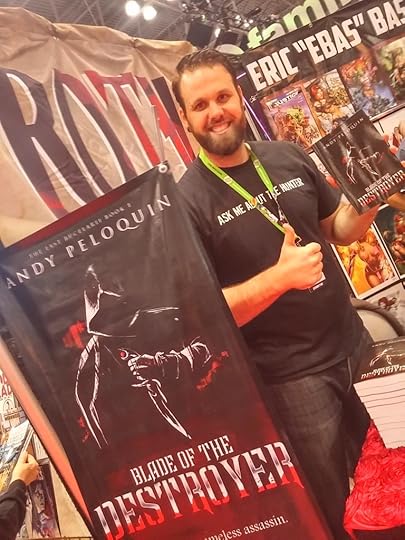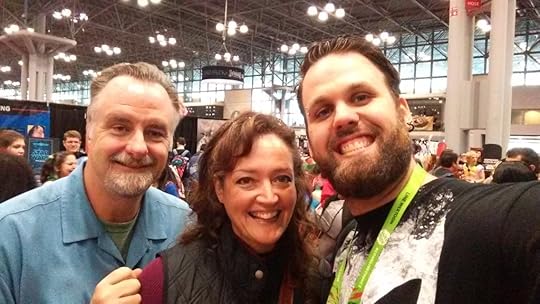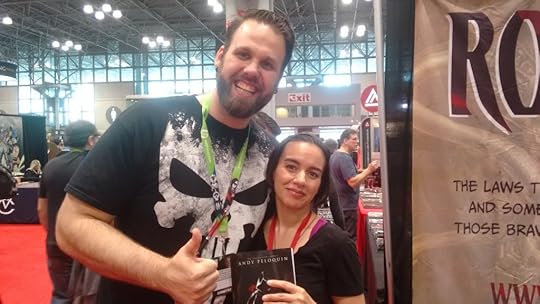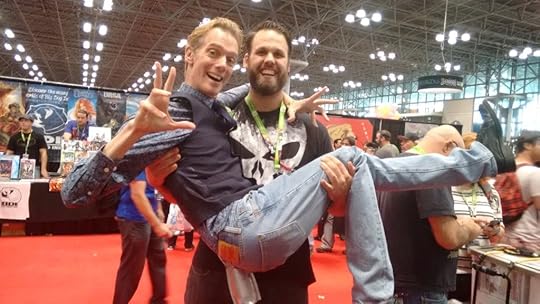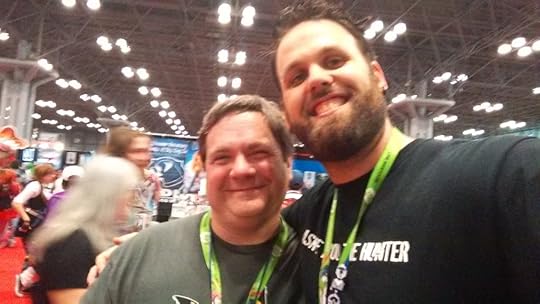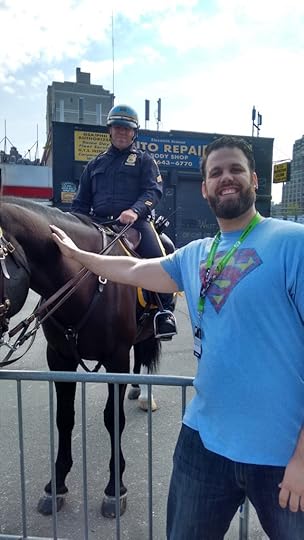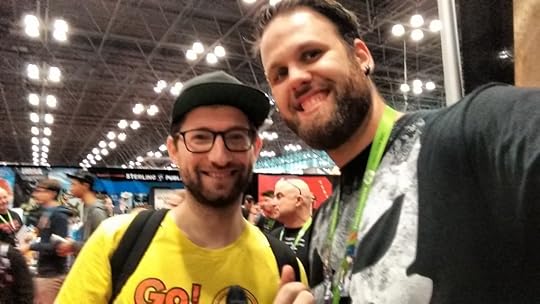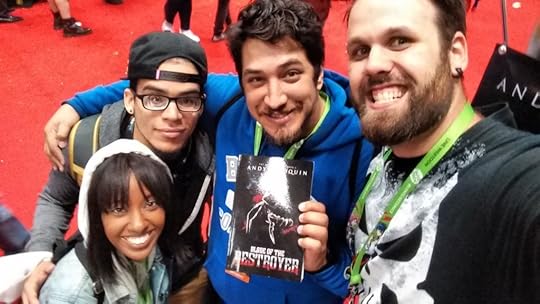Andy Peloquin's Blog, page 38
November 2, 2015
Writing Has Taught Me It’s Okay to Make Mistakes
When I started my writing journey, I had it in my head that I was going to be the one writer who never made mistakes. I was going to write the best characters, tell the most amazing stories, and all without a single flaw or error in my writing.
Boy, was I disabused of that notion in a hurry! By the time I finished publishing In the Days: A Tale of the Forgotten Continent, I had learned just how fallible I was.
When Blade of the Destroyer came into being, I quickly saw how much I had to learn. After having the book sliced and diced by the world’s best beta readers, I ended up re-writing an entire third of the book. Book 2 was only slightly less flawed, and I had to do a lot of re-writing to make the story work.
Now, as I’m working on Book 3 in The Last Bucelariiseries, I’ve come to a simple understanding: it’s not a bad thing to make mistakes, as long as you’re willing to admit that they really are mistakes and correct them.
I wrote Book 3 with a very definite goal in mind. I wanted to show that the main character, the Hunter, was making some progress as a human being. After the events of Books 1 and 2, there was a slight crack in his “tough guy” façade. But, like the human being that I am, I went a bit too far and made him “too human”. I gave him all these attributes and personality traits I’d expect of someone in that situation, without actually thinking about how HE would react.
Now that I’m re-drafting, I’m having to do a lot more re-writing than I’d expected. Thanks to my amazing alpha-readers, I’m changing the ending, adding another 10,000 or so words to the story, and changing some pretty core elements of the story. The result will be a better book, but it’s a lot of work.
But imagine how different things would be if I was so worried about making mistakes that I clung to my idea of what I believed to be “right”! Book 1 would have sucked right out of the gate, and none of the later books would get any better. After all, I would have stubbornly clung to my idea of perfection, and there would have been no room for improvement.
Let this be a lesson for all of us: making mistakes are a good thing. Once you understand that, you start to see them as a learning experience. When I sit down to write Book 4 (which I plan to start before the end of this year), I’m going to keep the lessons I learned from writing Books 1 through 3 in mind. When I write Book 5, I’ll have the addition of lessons from Book 4. All the mistakes I will have made will help me to be better as a writer, and it will be easier to adapt, change, and improve.
Don’t be so stuck on perfection that you can’t handle mistakes! Mistakes are a GREAT thing, provided you are willing to correct and improve. The more mistakes you make, the more you learn from them. See mistakes as a good thing, and you will mature and improve far faster than you would getting it right every time!
October 28, 2015
Book Review: Sons of Chenia by Josh Rutherford
It’s Book Review Wednesday, and I have a treat for you! The author of this book is a friend of mine from San Diego, and his book is definitely one I would recommend…
Sons of Chenia
Chenia is a land torn apart, the victim of decades of civil strife, rising drug abuse and widespread corruption. The resulting trend is wave after wave of its people fleeing its shores in search for better lives elsewhere.
In the midst of this years-long refugee crisis, five young men – friends forged by common experiences and circumstances – receive word that a relative has fallen ill. They journey back to their homeland to visit this sick relative only to find their country on the verge of invasion. With no military or police force to call their own, these friends must band together with locals to form a resistance and make a stand in one town before a superior foe overruns their land once and for all.
My Review: 4 Stars
The book has a very Tolstoy-esque feel to it. It has the depth of characters, narrative, and emotion that made Tolstoy’s books so appealing. It also has a very distinct “Russian” flavor to it.
The characters are well-developed, the culture is rich and diverse, and the book delves into a wide range of deep subjects. It’s a fantasy novel, but it takes a very realistic look at the way certain peoples, races, and religions have been marginalized and mistreated by others. Definitely a book worth reading!
There are a few issues, however:
Tense problems. In a few places, the book switches from past to present and back again for no reason.
Word repetition. Many paragraphs feature repetitive use of the same word, excessively so, in my opinion.
Lack of pronouns. It’s all “Tobin (for example) did this and Tobin did that” when it would have been easier and smoother to use a few more pronouns.
Heavy narrative. I felt the narrative was a bit ponderous and overstated in some places. In my opinion, the narrative could be trimmed by 20% (in terms of sheer word count) and it would still be good.
Despite these few issues, the book is DEFINITELY worth reading! If you like a more descriptive, narrative-heavy writing style, you’ll love this book.
Here’s a Taste:
Thank Ada for the stars.
Fyodor looked up at the predawn sky. Directly above, the black of night loomed. Like crystals the stars sparkled. With their patterns still visible, Fyodor was able to identify the constellations. The most recognizable was Ada’s Staff, a long line of stars with a crook at the end. Spanning from west to east, Fyodor learned from Dmitri that nomadic Chenians would use it to guide their journeys from the Frontier across the Sacred Plains to the Green River and beyond. Below Ada’s Staff was The Herd, a cluster of stars said to resemble a herd of wild horses racing straight ahead at full gallop. Fyodor could not make out such a resemblance. Nonetheless, he was always able to find the constellation. To the right of both of them was the Voja Trout and above that one was the Warrior Maiden, a constellation said to grant good luck on the eve of battle to those fighters that could find it.
Fyodor’s head tilted lower. Bordering the vaulted ceiling of the night were tones of violet and indigo. Below those dark shades, hints of orange and red shone on the horizon. Fyodor closed his eyes, took a breath and paused. When he opened them he imagined seeing these layers of sky for the first time. Knight’s Harbor was never like this, he remembered. The early morning was always blanketed in fog. Even when it lifted the sky still held hues of gray. But this, this is so much more. It feels right to look upon this sky, amongst these trees and boulders. It feels like, well, it feels like home.
Holding a graphite stick, Fyodor turned his attention back to the sketchpad in his lap. Katerina had packed it in Nicolai’s saddlebag, but Nicolai allowed Fyodor to use it, knowing how much he enjoyed writing and sketching. At first, Fyodor had hesitated using the pad. The pages were sheets of crisp, tan paper. Except for a few stanzas that Nicolai had written in characters that were foreign to Fyodor, the pad was blank.
But on their second night, the five of them had escaped the overcast skies of the coast to begin their ascent through the Casabbian Mountain Range. Much to Fyodor’s liking, one of Sergei’s books had a series of maps in them, even more extensive than those of the ship captain Fyodor had befriended on their journey across the Tartic. The book, Greater Chenia, had a number of ornate pages filled not only with maps but with detailed drawings of valleys, mountains, rivers, wildlife and vegetation. Sadly, some of the pages in the back were missing, having been torn out by a previous reader. Fyodor suspected that the pages had drawings of the constellations, since the surviving pages just before the torn had described them. Using those snippets of detail as a guide, Fyodor had offered to take the first watch on their second night, resolving to sketch those he could identify.
That night had been productive enough. Fyodor managed a rough sketch of the night above and had identified five constellations. But the third night was strewn with clouds while the fourth brought gales and showers. On the fifth night, Fyodor tried to resume his drawing where he had left off. But after two days of not seeing the night sky, the stars seemed foreign to him, so he found himself starting a different sketch. Now on their sixth night, Fyodor was feeling more confident of his star map, almost proud.
His efforts were helped by Dmitri and Nicolai. Dmitri, who had not spoken much to him on their oceanic voyage, exhibited a wealth of information on the night sky. During their nightly watches, Dmitri would often take over when Fyodor felt drowsy. It was during these shift changes that Fyodor would prod him for information on the stars. Dmitri had been able to point out every constellation listed in Sergei’s book, and even some that were not. Even during the day, Fyodor would find his friend looking up at the sky.
Dmitri’s reading of the stars proved invaluable to the trip. In fact, Fyodor felt that the five of them did not need to refer to Greater Chenia, except to verify Dmitri’s claims. It was Dmitri who would spur his mount to the head of their column and point the way. Every pass, every game trail, grove of trees or spring seemed to be known to him. He was so certain that Fyodor could have mistaken him for a local guide.
The rest of them were not so blessed except for Nicolai, who would on occasion stray from Dmitri’s course to point out an alternate route or campsite. Although he dutifully followed Dmitri like the rest of them, and would share their looks of astonishment when Dmitri would seemingly detect the right path, Fyodor noticed a glimmer in his eyes at moments, as though he was remembering a previously forgotten fact.
About the Author:
Joshua Rutherford has wanted to be a writer all his life. Through college and the more than dozen jobs that he has had, his passion for the written word has never ceased. After crafting several feature film screenplays and television pilots that were never produced, Joshua tried his hand at writing a novel. Sons of Chenia is the product of that effort. When Joshua is not writing – which isn’t often – he is spending quality time with his wife, Elisa. The two currently reside in San Diego, CA.
Find the book on Amazon: amzn.to/1ArEzg9
Tweet at him: https://twitter.com/AuthorJKR
Connect with him via Facebook: www.facebook.com/SonsofChenia
October 23, 2015
The Highlights of the Texas Book Festival
The 2015 Texas Book Festival was a total blast! I got to meet awesome people, enjoy some of the best of the Austin food and atmosphere, and even was able to visit with my sisters–who I haven’t seen in a couple of years. The weather was wonderful, the people were better, and all in all, the weekend went far better than I’d hoped.
Here are some pictures of the fun I had:
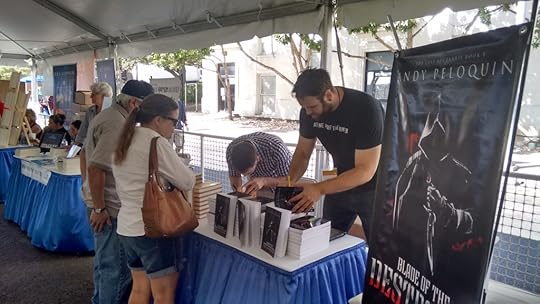
Signing up a storm!
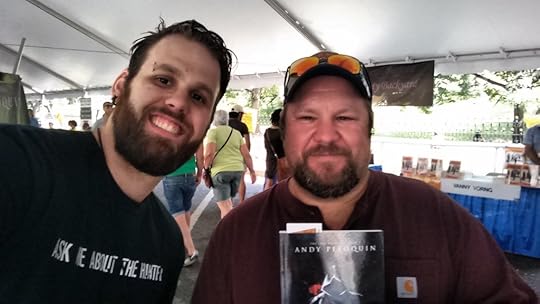
Notice the black contact lenses? Making my eyes look like the Hunter’s…
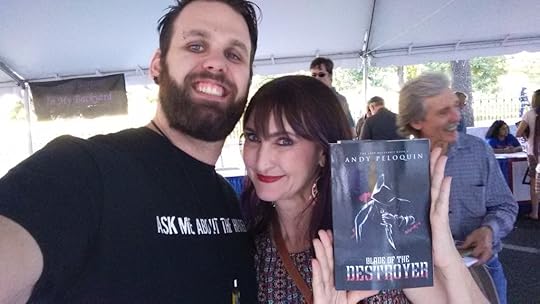
The BEST person ever!
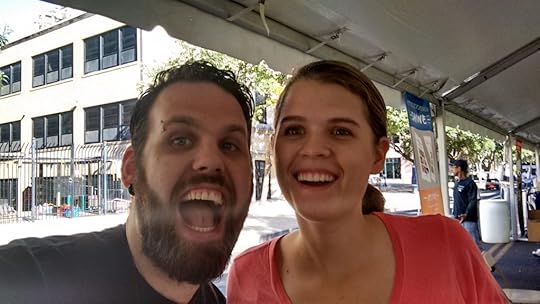
My tiny sister Lisa (future nurse/doctor)

My equally tiny sister Emmie (future writer)

My not-so-tiny sister Chelsey (future accountant)

The amazing Sam, a friend from nearly a decade ago!
All in all, I could not have had a better time…
October 21, 2015
Writing Has Taught Me to Adapt
“Adapt or perish, now as ever, is nature’s inexorable imperative.” — HG Wells
Adaptability is a writer’s best friend, but it’s definitely a hard one to develop!
When I started out copywriting/marketing/blogging five years ago, my skills as a writer were fairly limited. I could do one style of content, in one tone of voice, and with just one layout or structure.
Now, years later, I’ve developed my skills as a writer to the point where I can match any tone: formal, informal, informational, dry, comedic, sarcastic, and the list goes on.
In my journey as a novelist and author, I’ve learned that I have to adapt if I want to succeed.
I have started work on a SECRET SIDE PROJECT, set in the same world as The Last Bucelarii books, but following a different character (a woman this time). I participated in a Writer’s Bootcamp between March and September (2015), so created this story specifically for the Bootcamp. In an effort to do something new and different, I changed my writing style to be minimalist and only offer the most important details.
But as the book is going through the editing/revising process, a number of alpha readers have commented on how there is a lack of understanding of and connection to the character. If you’ve read Blade of the Destroyer, you’ve seen what it’s like to live in the character’s head. In this new project, I described everything via narrative rather than getting inside her head.
Of course, now that I’ve heard that there’s a lack of connectivity, I have begun to rewrite and put the reader inside this girl’s head. When I sent the re-drafted version to an alpha reader, they commented on how much easier it was to understand–and thus relate to–the character, and they said the book is MUCH better as a result.
So, adapting leads to improvement, and that’s what being a writer is all about. The more you improve, the better you will become, and the easier it will be to communicate clearly to your readers.
My advice to writers (both new and experienced), and to everyone: Don’t be stuck on one way of doing things. Adapt as needed, and be willing to change things in order to improve. The more you adapt, the higher your chances of success!
October 19, 2015
Hell Becomes Her Cover Reveal
Hell Becomes Her , the latest book in R.A. McCandless’ Flames of Perdition series,
releases Thursday, November 19th. Here’s what all the fuss is about:
Angels should be a human’s worst nightmare. Del didn’t think there was anything worse than angels, or their fallen kin, demons. She and her partner Marrin helped to keep the world safe from the horrors of escaped demons for generations. But when Del’s daughter is kidnapped by a shadowy group, Del will find that the world is even more dangerous than she suspected.
There are worse things than angels and demons.

Release Thursday, November 11th
Excerpt
The doors slid back exactly as they were supposed to, and Del pointed both her SIGs through the opening. She knew it was wrong. Two hands on one gun with a straight-thumbs hold was the correct way to give proper support to aim and shoot quickly and consistently. Hollywood liked to show action heroes shooting from the hip, or blasting away without aiming and taking down a room full of bad guys, whose best response was to fire impotently at the ceiling or comically into other bad guys. It was all so much useless eye candy. A gun in each hand gave support to neither and made it impossible to sight. She’d need independent use of each of her eyes, like a chameleon, to train the guns on different targets at the same time. Del knew it was wrong, but it looked damned impressive from the receiving end. “Hold your fire!” a voice commanded from outside the elevator. “Hold your fire!” Del wasn’t certain if the order was for her, the two ranks of Ljosalfar soldiers in their body armor who surrounded the elevator, or both. Either way, holes weren’t being punched into her favorite skin and that was a good thing. She might still die, riddled with bullets and spitting blood, but not yet. Not yet. She unwrapped and wrapped her fingers on her SIGs, and smiled. “Hello boys,” Del said. “Who wants some?” “Hold your fire!” Alfred Waru said again. “Alfred, you cunning bastard,” Del purred. “Come on in and give me a hug. I’ve solved almost all your problems. There’s only one left.” “I’d rather you put down your weapons,” Alfred replied. Del homed in on his voice from behind the second rank of soldiers, but couldn’t make him out through all the helmets. “We’ve locked the elevator. The doors won’t close, and the car won’t move. Let’s talk about this.” “Talk about what?” Del said and laughed. “How you lied to your people? How you betrayed and murdered your own? How you’ve doomed them through your schemes and plots?”
Hell Becomes Her releases Thursday, October 19th 2015
October 16, 2015
The Highlights of NYCC 2015
Well, New York Comic Con has come and gone, and I loved every exhausting minute of it! What a blast it was. Here are a few of the pictures highlighting the event and all the awesome people I met:
October 14, 2015
Book Review: Skyshaker by Dean Wilson
It’s Book Review Wednesday, and I’ve got a pretty awesome book for you this week–the third part in a steampunk series I’ve already reviewed (find the reviews for Hopebreakerv and Lifemaker here…)
Skyshaker
The Resistance takes to the clouds aboard the Skyshaker, the newly-completed airship aimed at dominating the heavens, when the land far below has become a hellish place ruled by demons.
General Rommond fixes his attention on the city of Blackout, the old capital of the world, controlled by the Treasury, who are themselves controlled by the ruthless Regime. The skies above that city will no longer hide in smog; fire and fury will light up the sky. That centre of the old civilised world will either shift allegiance to the Resistance, or it will burn to the ground.
Yet there are always others who will resist the attempted change of power. From sky pirates and mob bankers to the feared mechanical men of the Iron Guard, Jacob and his new family of freedom fighters will face greater challenges than they have ever faced before. As bombs drop from the sky like the iron tears of gods, there are other revelations that will shake the foundations of everyone struggling to save humanity.
My Review: 4.5 Stars
Dean keeps getting better with every book. This is the best of the series, and I have no complaints regarding character development, plot, and more. The story was well written, the climax was excellent, the twists were surprising and intriguing, and the book was well done. After reading this book, I’m excited to learn what happens in the next book.
The only thing that irked me slightly is the names. Now that we’ve got four names (Hopebreaker, Lifemaker, Skyshaker, and the soon-to-come Earthquaker) I felt like they are a wee bit heavy-handed and overdone. Of course, I understand that this is the theme of the book, but I find myself wishing for a change. However, I also realize that that is my opinion, and it in no way affects my enjoyment of the book.
Pick it up, because it’s definitely a solid read!
Here’s a Taste:
Jacob was not keen to be back inside the metal box of a landship, that claustrophobic vessel, that roving coffin. It was dark inside, but the sunlight pierced the city’s smog, and so he could easily see where Rommond roamed. Not that it was necessary. The target was pretty obvious. The target of the Iron Guard was pretty obvious too; it was everybody else.
The streets were eerily silent. Few dared take on this mythic foe. They cowered in their houses. Perhaps those who opposed the Resistance hoped that the Iron Guard would liberate the city, restore some order, and then the people could emerge again without fear. But from what Rommond had told him, Jacob knew that the Iron Guard were indiscriminate. If they had been sent to Blackout, it was not to liberate; it was to annihilate.
“What a mess we’re in,” Jacob said to the gunner who had joined him.
She did not reply. He did not even know her name. She kept her focus on the gun, on the enemy. The silence got to Jacob. He needed something to distract him from his thoughts, from his mounting fears. A little joke might have meant nothing to some, but it meant everything to him.
Then he saw the mechanical men for the first time. They had a human shape, but it was augmented with machinery, with cogs and pistons, with pumps and pulleys, with wires and tubes. Natural anatomy was replicated and replaced with an artificial equivalent, and so the creatures were “enhanced.” The humanity was drained from them, and all that was left was a cold-hearted killer, with guns for arms, and a crosshair for eyes.
Jacob shuddered as he saw them, but his gunner did not shudder; she rattled off her gunfire, which knocked down some of the iron monsters, but did not appear to kill them. Jacob felt the gun that Rommond had given him resting in its holster on his belt, augmented with its own machinery. He could not use it from here, and he did not have many diamond-coated bullets to use.
So he drove into the mechanical men, knocking them down, crushing them beneath the heavy treads of the landship. Yet still they seemed to survive all this, and many sat or stood up and began to repair what damage had been caused. Others fired at the four landships, which whizzed through the streets, drawing the attention of the hundreds of machine men who emerged from the Black Barge.
Rommond drew much of their gunfire. It seemed they somehow knew which of the landships he was in. Perhaps it was how he drove, or the tactics he used to weave in and out of them, inviting them to fire on their fellow men, to kill their own as they tried desperately to kill him. He could not turn as sharply in the Menacer Mark II landship as he could in the Hopebreaker, and the hull was not as thick, so it was soon riddled with bullet holes, which were clearly visible to the drivers of the other vehicles.
Rommond led them back towards the Skyshaker, luring out the machine men, who marched in mechanical rhythm, with the percussion of gunfire enhancing their methodical beats. When they approached the Skyshaker, Taberah was ready for them. She still sat in her glass bubble, but she looked as grim and determined as ever, and her fingers were itching on the triggers. Dozens of the enemy were gunned down, but they did not yet die. They struggled on the ground, with parts blown away, with wires disconnected, with their steam pumps no longer generating any steam. The Copper Vixens raced over to the wounded and aimed the guns that Rommond had designed, and put those poor creatures, or those poor machines, out of their mechanical misery.
The first wave had been defeated, and the landship drivers regrouped beside the Skyshaker, where they witnessed the pile of bodies, and the pile of parts, that they had left in their wake. Jacob popped his head outside and wiped his brow; the heat inside was killing him, but it was better than what the Iron Guard would do.
The Resistance savoured this moment of reprieve, this temporary delay of their iron punishment, but their rest was brief. A second and a third flood of figures emerged from the Black Barge, much larger than the first.
“They’ve brought more men!” Alakovi shouted.
“So be it,” Rommond said. “When you bring more wood, you make a bigger fire.”
About the Author:
Dean F. Wilson was born in Dublin, Ireland in 1987. He started writing at age 11, when he began his first (unpublished) novel, entitled The Power Source. He won a TAP Educational Award from Trinity College Dublin for an early draft of The Call of Agon (then called Protos Mythos) in 2001.
He is the author of the Children of Telm epic fantasy trilogy and the Great Iron War steampunk series.
Dean also works as a journalist, primarily in the field of technology. He has written for TechEye, Thinq, V3, VR-Zone, ITProPortal, TechRadar Pro, and The Inquirer.
Find the book on Amazon US: http://www.amazon.com/dp/B00YM3W392/
As well on Amazon UK: http://www.amazon.co.uk/dp/B00YM3W392/
Visit his Website: http://www.deanfwilson.com
Connect with him via Facebook: https://www.facebook.com/deanfwilson
Tweet at him: https://twitter.com/deanfwilson
Google+: https://plus.google.com/+DeanFWilson
October 12, 2015
Writing Has Taught Me How to Handle Disappointment
Life is filled with disappointment! There’s no two ways about it. No matter how hard you try, how smart you think your plans are, or how well you have prepared, life has a way of messing everything up. Plans go awry, fail, or are knocked completely out of whack. How you handle them, that’s what matters!
I just spent the weekend at New York Comic Con, having a blast interacting with fellow authors, artists, and geeks/nerds. It truly was one heck of an awesome weekend!
I was fortunate enough to have a space in the convention to sell paperback copies of The Last Bucelarii (Book 1): Blade of the Destroyer:
When I planned for the weekend, I figured I could sell X amount of books. I ordered that number of books, set up my little spot, and got to work! At the end of the weekend, I had sold less than half the number of books I had expected. Talk about disappointment!
All through the day, I had to tell myself not to worry, get stressed, or anxious because things weren’t going as well as I had planned. I had to force myself to be happy with the results I got.
But then I came to a simple realization: I did great! I met a lot of awesome people, made new friends, got my book in the hands of a significant number of people (all of whom, I’m sure, will be hooked!), and made some great contacts in the industry. While nothing concrete has materialized from anything (beyond the immediate sales), the potential for growth and expansion in my career more than makes up for the “disappointment” of not reaching my goal.
And there’s a bonus: When talking to a Big Four publisher (who had a booth just a few feet away from mine), I found out that I sold more books over the weekend than the average new author. We’re talking books from publishers like Tor, Random House, and Simon & Schuster!
None of this is to toot my own horn, but it’s just to help put things into perspective. I felt disappointed by what I felt was a failure to reach a goal I had set, but once I accepted that things were the way they were and found the “silver lining” in the situation, everything started to seem so much better.
Now, as I’m on my way to the Texas Book Festival (in Austin next weekend), I’m looking forward to everything. I may feel the twinge of disappointment if I don’t sell as many books as I had expected, but I will take my lumps and find the good in the situation. And trust me, there is always good!
October 7, 2015
Book Review: Divine Intervention by Edward Davies
It’s Book Review Wednesday, and I’m bringing you an unusual book–one quite unlike anything else I’ve ever read…
Divine Intervention
Jimmy Stewart Moon – his parents had been big fans of ‘It’s A Wonderful Life’ – was bored, but not for much longer…

When he accidentally falls out of his bedroom window whilst peeping at his next door neighbour, he meets Frank – a man who claims to be God! Not only that, but Frank claims that His only reason for being on Earth is to help Jimmy get together with the girl of his dreams.
Unfortunately where there’s God, it always follows that there’ll be a Devil…
My Review: 3.5 stars
If there is one word to describe this book, it would be “odd”.
I didn’t understand the purpose of this story, and, while I enjoyed it enough, there was no underlying theme. It didn’t make me think, didn’t teach me anything, and certainly didn’t have any important takeaways.
There were also A LOT of British-isms and expressions to be written for an international audience. The storyline went all over the place, and it was both unusual and erratic. At the end, there was a sudden shift in one of the characters that was completely incomprehensible, unrealistic, and made the character both weak and two-dimensional.
The writing wasn’t bad, but there was a good deal of passive constructions–along with the occasional grammar and punctuation mistake. Not bad, but not great.
That being said, I have to say that I enjoyed reading it. It was humorous, dry, and witty, and it made fun beautifully of the sort of “dull” modern person. It was a short, easy read, and it’s one that I think most people could enjoy.
Here’s a Taste:
Jimmy pushed the door open to the sound of a bell. The shop was extremely dark, with racks of old clothes wrapped in polythene crammed into every nook and cranny. Jimmy eyes the place with suspicion, looking back at Arty.
“Go on,” Arty enticed, “have a look around.”
Jimmy turned back, walking further into the shop. It wasn’t until then that he noticed a middle- aged man in dark glasses standing behind a counter at the back of the store. This was Dodgy Dave. He had long hair, shaved at the sides and held back in a ponytail. He flicked idly through a copy of NME, every so often stopping to draw moustaches on the singers he didn’t like.
“Bastards!” he muttered under his breath.
He scratched at his thin goatee beard, attached to his gaunt jaw, trying to decide whether or not he should go to the toilet. That was when he looked up and saw Jimmy and Arty.
“Can I help you?” he croaked.
Jimmy fell silent, letting Arty speak for both of them, “My friend here is looking for some punk clothes,” Arty said, “do you have any in stock?”
“I dunno,” Dodgy Dave shrugged, “why don’t you have a look – everything I have in stock is on the shop floor.”
“Shop floor?” Jimmy sniggered, “Like this place even has a stock room!”
“Be nice, Jimmy,” Art warned, “I don’t think Dodgy Dave likes it when people rip the piss out of his establishment!”
“Have you got a problem, kid?” Dave asked, glaring at Jimmy, “Because if you do, you can sling your bloody hook right now!”
“I apologise,” Jimmy apologised, “I didn’t mean to disrespect your shop.”
“That’s better,” Dave looked back down at his magazine, “the punk clothes are at the front.” he pointed a skinny finger to the front of the store, “On the right.”
“Thank you.” Arty bowed slightly, dragging Jimmy to the front of the store.
“So what are we getting?” Jimmy asked half- heartedly.
“Well, first things first, we need to get you a new pair of trousers.” Arty began to rifle through the rail, “Something with patches, perhaps even chains,” Art pulled a pair of trousers out from the rail, “these look pretty good, don’t you think?”
Jimmy eyed the jeans distastefully, “I dunno, Arty. I mean, the punk look is all well and good, but those chains are a bit much.”
“No they’re not. They look really cool! I’d wear them!”
“You would?” Jimmy asked distrustingly, “Even with the patches?”
“Yeah.”
“And the stains?”
“Yeah? What stains?”
Jimmy pointed at various creamy-coloured stains down the front and on the crotch of the jeans, “Those stains!”
Arty eyed the stains, realising what they were, then lied, “Those aren’t stains,” he scoffed, “these are stone wash jeans – they’re supposed to look stained!”
“You’re sure?”
“Positive!”
Jimmy took the jeans from Arty and held them up to the light, “I suppose they’re not that bad,” he sighed, “but do you really think that Vanessa will like me in them?”
Arty grinned, “Of course she will. Now stop asking stupid questions – we still need to complete the outfit.”
Arty resumed flicking through the rail, finding an old t-shirt of the Union Jack, a PVC mock-leather jacket, a box containing a pair of steel- capped combat boots, and a chain-mail belt.
“Go and put these all on,” Arty ordered, “there’s a changing room over there!”
Jimmy took the bundle of clothes and walked into the changing room, Arty smiling all the while. He couldn’t believe the lengths Jimmy was going to for Vanessa, though he couldn’t blame him, and he was desperately looking forward to seeing the end result of Jimmy’s transformation into a complete twat!
Jimmy emerged from the changing room looking like Swampi on a bad day. Arty bit his lip, trying to suppress giggles.
“Well?” Jimmy half-asked, holding out his arms, “How do I look?”
“Great!” Arty lied, “You look terrific, pal!”
Jimmy looked down at his clothes, most of which were stained in one way or another, “You don’t think it’s a little over the top do you?” he asked.
“No, no. Of course it isn’t.” Arty folded his arms, pretending to admire Jimmy’s outfit, “in fact, it’s quite subtle. I just wish they had another pair of those jeans!”
“But there was…”
“No there wasn’t,” Arty lied, ushering Jimmy to the counter, “now, hurry up and pay so we can get going on this wooing Vanessa business!”
Jimmy walked up to the counter, where Dodgy Dave was still reading his magazine. He looked up at Jimmy, raising an eyebrow, “Would you like a bag for your other clothes?” he asked casually.
“Yes, please,” Jimmy smiled, “if it’s not too much trouble.”
“No, no trouble at all,” Dave said, fishing for an old plastic bag under his counter.
Jimmy pulled his wallet out of his old trouser pocket, rifling through his notes, “How much do I owe you?”
Dave eyed the wallet, making a note of how much money he had, “Fifty-five quid.” he said, resting his left hand on the counter, holding out the other for the money.
“Fifty-five?” Jimmy couldn’t believe how much these old clothes had cost him as he handed over the money, “Well, I suppose it’s all worth it if it wins me the hand of Vanessa!”
“That’s the way to think,” Arty said, patting Jimmy on the back as they made their way out of the shop. As they reached the doors, Arty turned back and winked;
“See ya, uncle Dave,” he whispered.
“See ya, Arty,” Dave winked back, resuming his reading.
About the Author:
Edward Davies was born in London in 1978. The product of a Welsh father and an Irish mother, he now lives in New Zealand with his Kiwi wife and son. He studied Sociology at Kingston University in the hope of getting insight into people’s characteristics so that he could better create more realistic characters in his books. Divine Intervention is his first published work.
He is released a full-length novel called “The Girlfriend Wager” in November–check it out!
Find the book on Amazon: http://www.amazon.com/Divine-Intervention-Edward-Davies/dp/1465382313/
And Amazon UK: http://www.amazon.co.uk/gp/product/B006O4LA7S/
Tweet at him: https://twitter.com/Mutant_Toe
Read his thoughts on his website: https://themusingsofedwarddavies.wordpress.com/
October 5, 2015
Writing Has Taught Me to Worry Less
When I first started writing, I remember being incredibly stressed because I couldn’t quite figure out some new plot twist or clever direction for my story. I would lay awake at night, tossing and turning, trying to figure out what came next.
What a waste of time that was! All that time spent worrying did me no good, as I was so focused on the fear of “What happens if I don’t figure this out?” that I had no brain power left to focus on actually figuring things out.
Now, I don’t worry AT ALL. I don’t have to struggle to figure out plot twists, story lines, or characters. I don’t have to wonder how I’m going to keep the reader interested. Instead of worrying about it, I’ve learned to trust.
You see, as I’m writing a story, my mind is already churning out what comes next. Subconsciously, I’m chipping away at the block of marble, trying to find that story. I’m figuring out a book or two in advance, or at least a few chapters in advance. Every time I come up with something, I write it down. The more I write down, the easier it is to work within the structure of what I have created. I don’t have to figure out enormous chunks of book, but I can break it down to figuring out one problem at a time.
I participated in a Writers Bootcamp from March to September 2015, with the goal of taking a book from inception to completion in just six months. When I started the bootcamp, I had no idea what I was going to write, but I didn’t let that bother me. I focused on the work I was doing (writing The Last Bucelarii (Book 2): Lament of the Fallen).
As the start date approached, I didn’t sweat it. Instead, I just let my mind wander. I took more walks, spent more time sitting and doing nothing, and let my subconscious mind interact with my conscious. Within just one week (yes, 7 days), I had the story, plot, and structure of the 100,000-word book. Sure, I developed more as I was writing, but I never let it worry me. I used my energy to figure out the problem, not worry about it.
Let that be a lesson to us all! The more time and brain power you spend worrying about stuff, the less energy you’ll have to focus on what really matters: finding the solution! Worry less, and you’ll get a lot more done.
I’ve never had to struggle to figure out a plot twist or something. My mind is always working on it, even subconsciously. Worrying won’t help me figure it out.




